A new report by the Union of Concerned Scientists (UCS) pinpoints portions of the U.S. at greatest risk of declining residential and commercial property values, and diminished city and county tax revenue due to flooding attributed to sea level rise.
The areas impacted face worse high tide flooding due to the effects of climate change, UCS says. The findings are the result of peer-reviewed analysis that used ZIP-code-by-ZIP-code data from Zillow Property Data.
The states found to be most at risk of flooding from rising seas are: Delaware, Georgia, Louisiana, Maryland, Massachusetts, New Jersey, New York, North Carolina, South Carolina, Texas, and Virginia. As much as 70% of some municipalities’ property tax bases could be at risk.
The analysis also provides risk assessment according to:
— Number of homes and commercial properties (by state and zip code).
— Current values of properties.
— The amount of money the properties contribute in annual property taxes, which fund schools, roads, and emergency services.
— How many properties could be spared if warming is limited to below 2 degrees Celsius.
— Near- and long-term impact projections, including within the next 30 years.
— Identification of areas where coastal property owners might experience recurring flooding so severe it limits their ability to live or work in these properties.
Related Stories
Codes and Standards | May 7, 2015
Lavish residential skyscrapers prompt concern over shadows
New York, San Francisco, Washington, D.C., and Boston among cities grappling with height regulations.
Codes and Standards | May 7, 2015
Several states moving to repeal prevailing wage laws
Anti-prevailing wage bills that apply to state-funded construction projects have been passed in West Virginia and Nevada. Similar laws could be passed in Indiana and Illinois.
Codes and Standards | May 7, 2015
New OSHA rule aimed at protecting construction workers in confined spaces
The agency says the rule will protect about 800 workers a year from serious injury.
Codes and Standards | May 1, 2015
Colorado House kills construction defects bill
The legislation would have made it harder for condo owners to sue builders.
Codes and Standards | May 1, 2015
New energy efficiency program, Tenant Star, gets OK from Congress
The voluntary program for commercial and government buildings is modeled after Energy Star.
Smart Buildings | May 1, 2015
FEMA to require states to evaluate risks posed by climate change
The aim is for states to do a better job planning for natural disasters they are likely to face in a warming world.
Codes and Standards | May 1, 2015
Department of Energy asks for feedback on cost-effectiveness of building energy codes
DOE’s RFI wants input on how to improve methodology on cost assessment.
Codes and Standards | Apr 22, 2015
New York State renews design-build authority
Five state agencies are allowed to use design-build on certain projects.
Codes and Standards | Apr 22, 2015
OSHA’s estimated cost of silica rule said to underestimate impact by $4.5 billion annually
The coalition says that OSHA’s flawed cost estimates point to flaws in the rule, and has urged the federal agency to reconsider its approach.
Codes and Standards | Apr 22, 2015
2016 Seismic Provisions for Structural Steel Buildings draft available for public review
The comment period is open until May 29.















